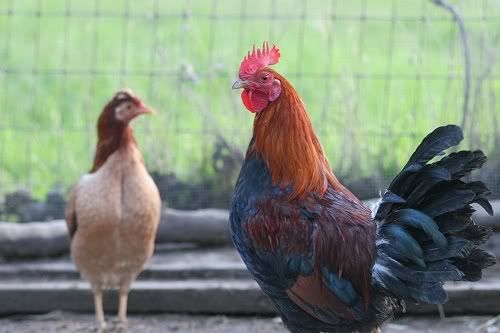 These are words spoken by Al Carter, director of animal operations at Moore County animal control in Eagle Springs, North Carolina.
These are words spoken by Al Carter, director of animal operations at Moore County animal control in Eagle Springs, North Carolina.He's talking about 74 roosters "rescued" from a cockfighting bust. In lieu of contacting sanctuaries or rescue agencies to try and save even a couple of these roosters, animal control officers spent six hours shooting every bird in the head. A bullet to the head may be a quick death if done properly, though I can't see how that's possible with a frightened, squirming chicken. But imagine if these were 74 dogs from a puppy mill - would your response to a bullet to the brain be a little different? Would you be a little offended or appalled if an animal control director said that all puppy mill dogs are good for is a bullet to the head?
The killing of fightbust roosters isn't anything new. The reality is that roosters, in general, have a hard time finding good homes, let alone a rooster conditioned to fight other roosters. This is not to say that former fighting roosters are bloodthirsty monsters bent on world destruction - they aren't. Eastern Shore Sanctuary in Maryland has a long history of managing former fighting roosters in a free-roaming environment. Animal Place has one rooster from a fight bust and has successfully placed several others in permanent homes. A few even live with other roosters and coexist peacefully. We rescued 130 hens and chicks (roosters included) from a fighting operation back in 2007 - all have been placed, all are thriving.
I won't argue that all roosters from all fighting operations should be placed. That is not a feasible reality for shelters - they do not have the time, staff or resources to indefinitely hold large numbers of roosters until all find homes. And right now, there are not enough homes for roosters - people are limited by how much land they own as much as by their city/county ordinances that often prohibit male chickens while allowing hens. Roosters who are far too human aggressive would only do well in homes with limited human interaction, too big of a request for most homes.

What I am arguing is simple: roosters from fight busts should be individually evaluated. They should be held for the same period as any other animal. Every reasonable effort should be made to contact rescues, sanctuaries and potential homes to place these birds. When those reasonable efforts fail, roosters should be humanely euthanized in the same manner as any dog or cat at most shelters, with euthanasia solution. They should not be shot in the head, they should not be painted as violently dangerous creatures, nor should they be treated as a flock. All roosters are individuals with their own personalities, quirks and temperaments. I remember helping to net hens at a fighting operation. A couple of roosters had been missed the first time around by animal control. One rooster was so friendly, I could pick him up without problem. The other was so frightened by all the commotion, that he fought tooth and nail to get away from me (and he pecked me once I caught him). Both were fighters, both had been forced to endure the bloody pit, but both were not the same. I'm certain many of you have companion dogs, cats, birds or rabbits - you know that your companions are not the same, the same is true of chickens.
It's time we shifted our perception of animals from fight busts. They are not the vicious animals some have painted them to be - they are all individuals, some with a greater ability to overcome their past than others. All should be given the same, fair treatment we expect for puppy mill dogs or for neglect/hoarding cases or, you know, for almost every dog and cat that enters a shelter. It should not matter if they are a certain breed or a different species. A chicken's ability to learn behavior isn't dramatically different from a dog's - you can clicker train chickens to learn new behaviors, though it's doubtful you'd ever be able to housetrain a chicken. :) Certainly a chicken's ability to feel pain or enjoy life is no different than a dog or a cat. Roosters deserve that small chance at a loving home too.






2 comments:
This makes me so very sad.
This is very sad, but thank you for sharing it on the Blog, Marji. Though bad things happen to animals in California, too, we are fortunate to live in a state where people are generally more enlightened about wild, companion, and farmed animals. I hope many people read this Blog post and are educated and moved to take action.
Post a Comment